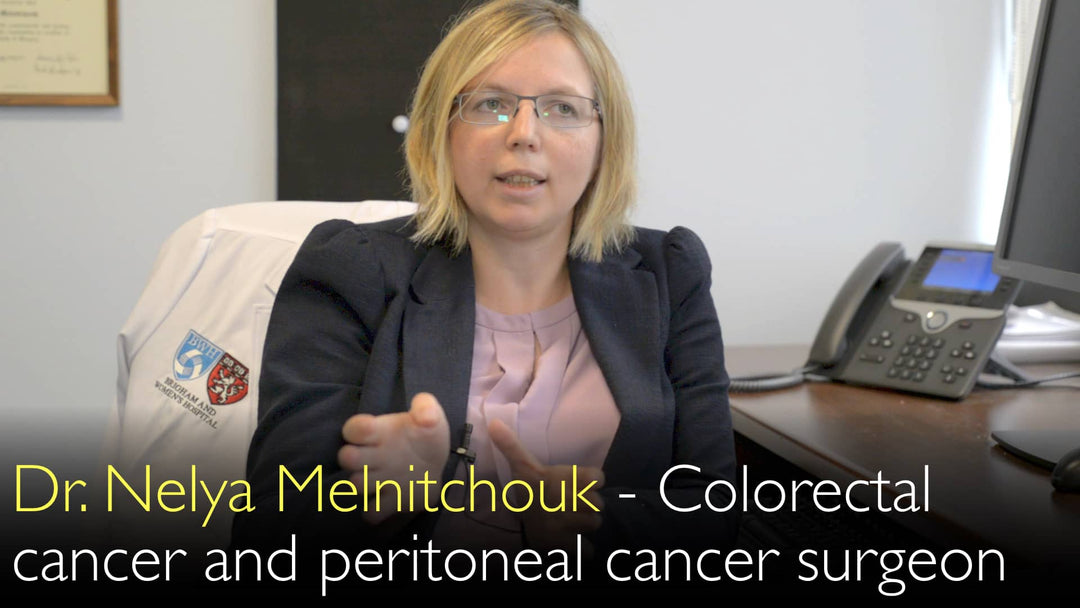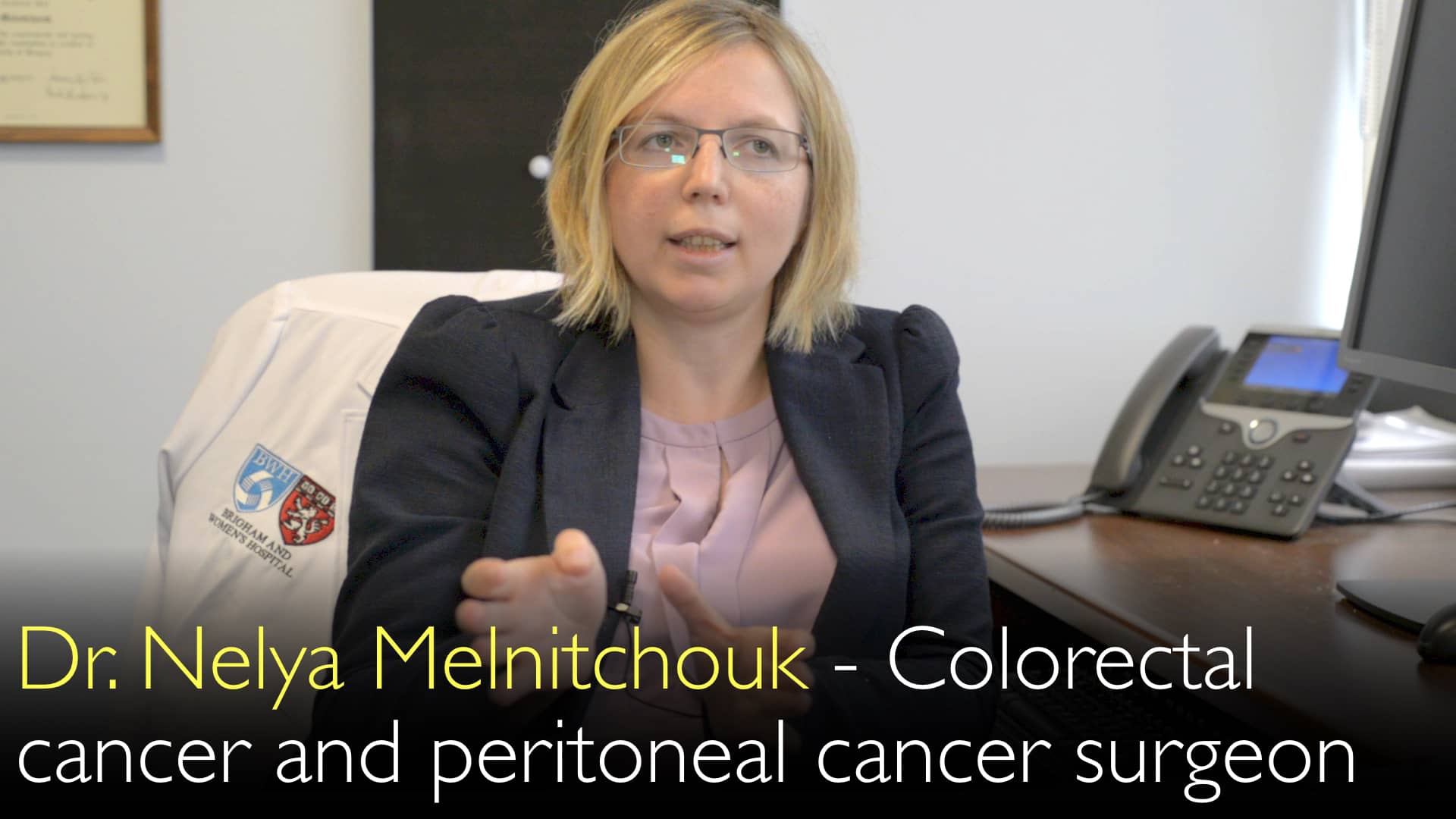Dr. Nelya Melnitchouk, en ledande expert på kolorektalcancer och peritoneala ytmaligniteter, förklarar hur man väljer rätt behandling för tjock- och ändtarmscancer. Hon belyser den avgörande betydelsen av preoperativ stagering för att utforma skräddarsydda behandlingsplaner. Dr. Melnitchouk går också igenom avancerade kirurgiska tekniker som HIPEC (hyperterm intraperitoneal kemoterapi), EPIC (tidig postoperativ intraperitoneal kemoterapi) och sfinkterbevarande ingrepp. Hennes expertis omfattar även minimalt invasiv laparoskopisk och robotassisterad kirurgi för att uppnå optimala resultat för patienter.
Avancerade behandlingsstrategier för kolon- och rektalcancer
Hoppa till avsnitt
- Behandlingsalternativ vid kolorektalcancer
- Målsättning med preoperativ stagering
- Sfinkterbevarande kirurgi
- HIPEC- och EPIC-ingrepp
- Minimalinvasiva tekniker
- Globala hälsoinitiativ
- Fullständig transkription
Behandlingsalternativ vid kolorektalcancer
Dr. Nelya Melnitchouk, en ledande kolorektalkirurg, diskuterar de många behandlingsalternativ som finns för kolon- och rektalcancer. Hon betonar att valet av behandling kräver en mycket individualiserad ansats. Behandlingen baseras på cancerstadiet, tumörens läge och patientens allmänna hälsotillstånd.
Dr. Melnitchouk förklarar att ett multidisciplinärt team är avgörande för optimal vård. Teamet inkluderar medicinska onkologer, strålterapeuter och patologer. Deras gemensamma expertis säkerställer att varje patient får en effektiv och skräddarsydd behandlingsplan.
Målsättning med preoperativ stagering
Preoperativ stagering är en hörnsten i behandlingen av kolorektalcancer. Dr. Melnitchouk framhåller dess huvudsyfte: att noggrant kartlägga sjukdomens omfattning. Processen innefattar avancerade bildtekniker som DT, MR och ibland PET-skanningar.
Exakt stagering gör det möjligt för kirurger att planera den mest lämpliga operationen. Det hjälper också till att avgöra om en patient kan dra nytta av neoadjuvant kemoterapi eller strålbehandling före operation. Denna strategiska ansats förbättrar både kirurgiska resultat och den totala överlevnaden.
Sfinkterbevarande kirurgi
Sfinkterbevarande kirurgi är ett centralt fokus i Dr. Melnitchouks kliniska arbete. Denna avancerade teknik möjliggör borttagning av rektalcancer utan att patienten behöver en permanent kolostomi. Målet är att bevara tarmkontinuiteten och upprätthålla livskvaliteten.
Dr. Melnitchouks expertis inom området är också ett viktigt forskningsintresse. Hon använder precisionskirurgi för att uppnå fria snittytor samtidigt som anal sfinktern bevaras. Denna metod är särskilt fördelaktig för patienter med lågt sittande rektaltumörer.
HIPEC- och EPIC-ingrepp
Som direktör för Programmet för peritoneala ytmaligniteter är Dr. Melnitchouk expert på HIPEC och EPIC. Hyperterm intraperitoneal kemoterapi (HIPEC) innebär att uppvärmd kemoterapi ges direkt i bukhålan under operation. Detta riktar sig mot mikroskopiska cancerceller som kan finnas kvar efter tumöravlägsnande.
Tidig postoperativ intraperitoneal kemoterapi (EPIC) är en annan specialiserad teknik hon tillämpar. Dessa aggressiva metoder används vid cancer som spridits till bukhinnan. De kan avsevärt förbättra överlevnaden för utvalda patienter med peritoneala ytmaligniteter.
Minimalinvasiva tekniker
Dr. Melnitchouk är en stark förespråkare för minimalinvasiv kirurgi vid kolorektalcancer. Hennes kliniska intressen inkluderar laparoskopiska och robotassisterade ingrepp. Dessa tekniker använder små snitt, vilket leder till mindre smärta och snabbare återhämtning.
Hon utför också kombinerad endoskopisk-laparoskopisk kirurgi för komplexa fall. Dr. Melnitchouk förklarar för Dr. Anton Titov att dessa avancerade metoder erbjuder hög precision. De är en del av modern, patientcentrerad cancervård.
Globala hälsoinitiativ
Bortom sitt kliniska arbete är Dr. Melnitchouk djupt engagerad i global hälsoforskning. Hon fokuserar på att förbättra screening och kirurgi för kolorektalcancer i låg- och medelinkomstländer. Hennes arbete syftar till att minska skillnader i tillgång till cancervård världen över.
Detta engagemang kompletterar hennes kirurgiska expertis. Dr. Melnitchouks holistiska ansats säkerställer att hennes inverkan sträcker sig bortom operationssalen. Hon arbetar för att främja behandlingen av kolorektalcancer både lokalt och internationellt.
Fullständig transkription
Dr. Anton Titov, MD: Hej från Boston! Vi är med Dr. Nelya Melnitchouk, biträdande professor i kirurgi vid Harvard Medical School. Hon är direktör för Programmet för peritoneala ytmaligniteter och HIPEC vid Brigham and Women's Hospital och Brigham and Women's Faulkner Hospital i Boston.
Dr. Melnitchouk tog sin läkarexamen vid Albert Einstein College of Medicine i New York. Hon avslutade sin allmänkirurgiska specialistutbildning vid Brigham and Women's Hospital vid Harvard Medical School. Som resident mottog hon Rudolf Vollman-priset för excellens i undervisning.
Dr. Melnitchouk avslutade sin kolorektalkirurgiska fellowship vid det kombinerade kolorektalkirurgiprogrammet vid Memorial Sloan-Kettering Cancer Center och New York Hospital/Weill Cornell Medical Center i New York.
Dr. Melnitchouks forskningsintressen omfattar utfallsresearch och global hälsa, screening för kolorektalcancer och kirurgi i låg- och medelinkomstländer, kolorektalcancerkirurgi och gastrointestinala komplikationer hos hjärtkirurgipatienter, samt sfinkterbevarande kirurgi vid rektalcancer.
Hennes kliniska intressen inkluderar också minimalinvasiv kirurgi, laparoskopiska, robotassisterade och kombinerade endoskopisk-laparoskopiska ingrepp, samt sfinkterbevarande kirurgi vid rektalcancer och inflammatoriska tarmsjukdomar.
Dr. Melnitchouk, hej och välkommen!
Dr. Nelya Melnitchouk, MD: Hej, Anton. Tack så mycket för att du kommer hit för att diskutera några frågor inom kolorektalkirurgi.
Dr. Anton Titov, MD: Låt oss börja med kolon- och rektalcancer. Det finns många behandlingsalternativ idag—hur väljer man rätt behandling? Vilka är målen med preoperativ stagering vid kolon- och rektalcancer?





